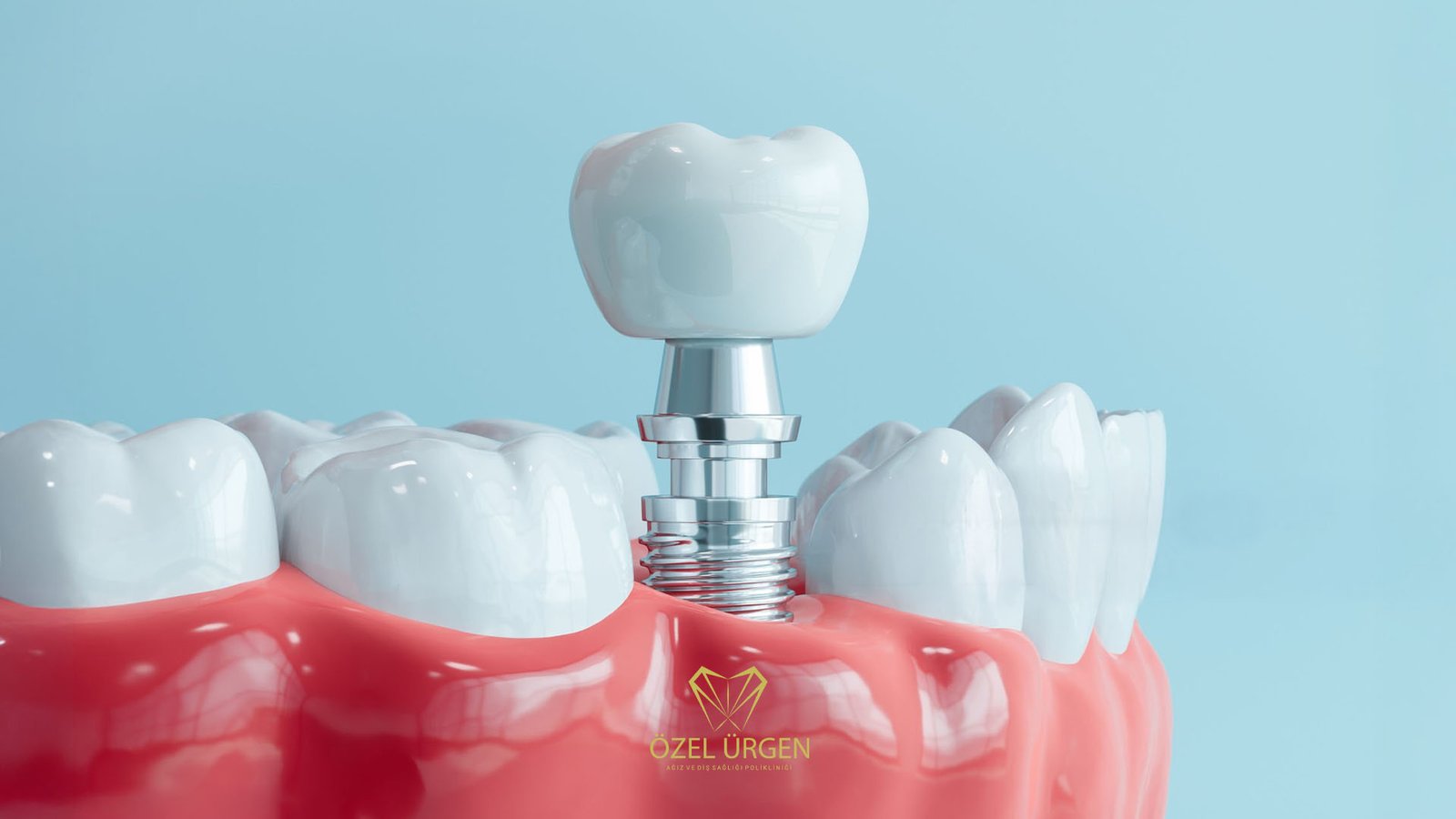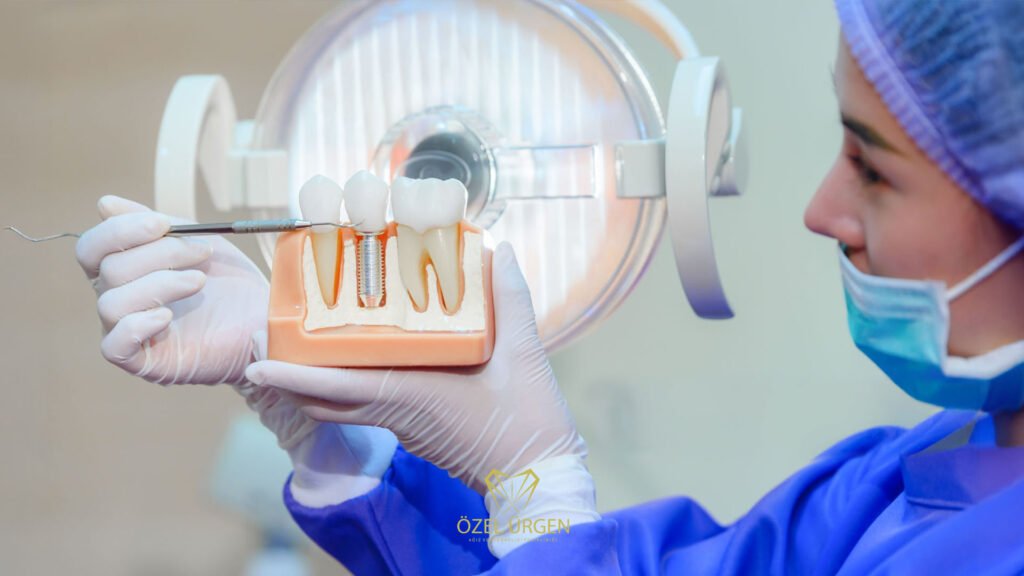- Mon - Fri 10:00 - 19:00
- Hacıhalil, Hükümet Cd. No : 80 Gebze/Kocaeli
- info@urgendis.com

Missing teeth not only affect the aesthetics of your smile but can also lead to serious issues that impact daily life. Problems such as impaired chewing function, changes in eating habits, and difficulty speaking are among the most common consequences of missing teeth. Over time, bone loss in the jaw may also occur, negatively affecting both facial aesthetics and oral health.
Modern dentistry has developed advanced methods to provide permanent and effective solutions to these problems. Foremost among these is implant treatment. Implants, which are titanium screws placed into the jawbone, restore missing teeth both functionally and aesthetically in the most natural way. Closely mimicking the appearance and feel of natural teeth, implants help patients maintain their daily lives comfortably and boost their self-confidence.
Today, implant treatment is not only applied for single-tooth loss but also safely used for multiple missing teeth or even completely edentulous patients. The treatment plan is customized for each individual, taking into account bone structure, oral health, and lifestyle, ensuring both long-lasting and aesthetically satisfying results.
The primary goal of implant treatment is to replace missing teeth by placing artificial roots into the jawbone, onto which prosthetic teeth are mounted. These artificial roots are typically made of titanium or special biocompatible materials and integrate with the jawbone to function like natural tooth roots. This approach restores both the aesthetic impact of missing teeth and the functionality of chewing and speaking.
Compared to traditional prosthetic methods, implants offer the major advantage of being supported by the jawbone, which helps prevent bone loss. This feature contributes to preserving facial contours and maintaining a healthy jaw structure over time. In short, implant treatment not only replaces missing teeth but also provides a safe and permanent solution that protects oral and facial health holistically.

Implant treatment is generally suitable for anyone with good oral and overall health. However, in some cases, planning and implementation require additional care.
For example, patients with insufficient jawbone thickness or density may require additional procedures, such as bone grafting (augmentation), to ensure the implant is placed securely. Patients with chronic conditions—such as diabetes or heart problems—must get approval from their physicians before treatment. Additionally, smoking and oral hygiene are important factors that directly affect implant success.
For every patient, the treatment process begins with a detailed examination. Panoramic X-rays and, if necessary, 3D tomography scans are taken to carefully assess the jawbone. This step is critical to ensure that the implant is placed both securely and durably. With a personalized plan in place, the patient can confidently begin implant treatment.
Natural Appearance and Function: Implants integrate with the jawbone and gums, providing a functional and aesthetically natural smile with the prosthetics mounted on them. Both your smile and chewing function feel completely natural.
Bone Preservation: Missing teeth can lead to bone loss over time. Implants stimulate the bone continuously, preventing this loss and helping maintain facial structure.
Comfort and Confidence: Unlike removable dentures, implants are fixed and provide a safe, comfortable experience while talking, eating, or smiling.
Long-Lasting Solution: With regular care and check-ups, implants can last for many years, even a lifetime, making them a permanent solution.
No Impact on Neighboring Teeth: Unlike bridge treatments, there’s no need to alter adjacent healthy teeth. Implants provide independent support without affecting other teeth.

Implant treatment is carried out in carefully planned stages, with the patient’s comfort and safety prioritized at every step. The process begins with a detailed examination, evaluating the missing tooth area, jawbone density, and gum health. If needed, 3D tomography is used to analyze the bone structure and determine the implant’s size, diameter, and position. Then, under local anesthesia, the implant is surgically placed into the jawbone. Using modern techniques, the procedure typically lasts 30–60 minutes, with minimal discomfort.
The process of osseointegration, where the implant securely fuses with the jawbone, usually takes 2–6 months. During this period, the implant becomes firmly anchored. Once osseointegration is complete, a custom-made crown, bridge, or full prosthesis is attached to the implant. The prosthetic is designed to match the natural teeth and smile, providing a long-lasting, functional, and aesthetically pleasing solution.
Yes, diabetic patients can undergo implant treatment if conditions are suitable, but extra precautions and planning are required. In patients with well-controlled diabetes, implant placement is generally considered safe. However, it is crucial to maintain stable blood sugar levels and good oral hygiene. Before treatment, the dentist assesses the patient’s overall health and diabetes control, coordinating with the relevant physician if needed.
Since healing may take slightly longer in diabetic patients, the implant’s integration with the bone is carefully monitored, and regular follow-ups increase the success rate. This way, diabetic patients can also achieve a healthy and aesthetic smile.

Implant prices vary depending on the type of implant used, the scope of the procedure, the condition of the patient’s jawbone, and any additional treatments that may be required. Since the treatment plan is customized for each patient, an exact cost can only be determined after a detailed examination and evaluation. Pricing in implant treatment does not only cover the cost of materials but also includes all stages such as the surgical procedure, prosthetic application, and follow-up appointments.